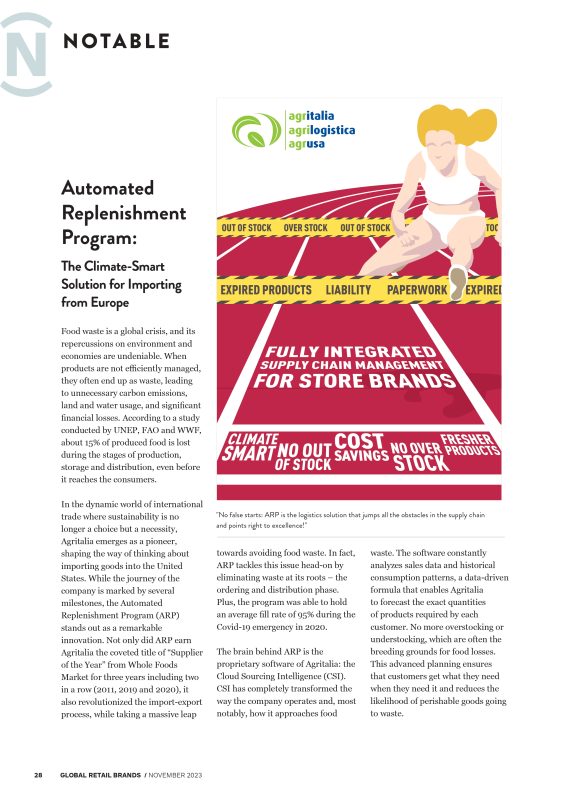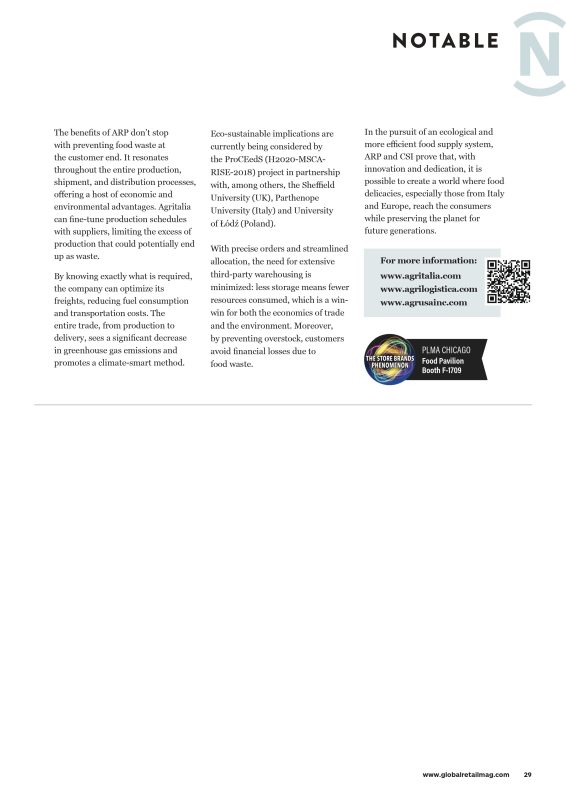Automated Replenishment Program: The Climate-Smart Solution for Importing from Europe
Global Retail Brands – November 2023 – Food waste is a global crisis, and its repercussions on environment and economies are undeniable. When products are not efficiently managed, they often end up as waste, leading to unnecessary carbon emissions, land and water usage, and significant financial losses. According to a study conducted by UNEP, FAO and WWF, about 15% of produced food is lost during the stages of production, storage, and distribution, even before it reaches the consumers.
In the dynamic world of international trade where sustainability is no longer a choice but a necessity, Agritalia emerges as a pioneer, shaping the way of thinking about importing goods into the United States. While the journey of the company is marked by several milestones, the Automated Replenishment Program (ARP) stands out as a remarkable innovation. Not only did ARP earn Agritalia the coveted title of “Supplier of the Year” from Whole Foods Market for three years including two in a row (2011, 2019 and 2020), it also revolutionized the import-export process, while taking a massive leap towards avoiding food waste. In fact, ARP tackles this issue head-on by eliminating waste at its roots – the ordering and distribution phase. Plus, the program was able to hold an average fill rate of 95% during the COVID-19 emergency in 2020.
The brain behind ARP is the proprietary software of Agritalia: the Cloud Sourcing Intelligence (CSI).
CSI has completely transformed the way the company operates and, most notably, how it approaches food waste. The software constantly analyzes sales data and historical consumption patterns, a data-driven formula that enables Agritalia to forecast the exact quantities of products required by each customer. No more overstocking or understocking, which are often the breeding grounds for food losses. This advanced planning ensures that customers get what they need when they need it and reduces the
likelihood of perishable goods going to waste.

The benefits of ARP don’t stop with preventing food waste at the customer end. It resonates throughout the entire production, shipment, and distribution processes, offering a host of economic and
environmental advantages. Agritalia can fine-tune production schedules with suppliers, limiting the excess of production that could potentially end up as waste.
By knowing exactly what is required, the company can optimize its freights, reducing fuel consumption and transportation costs. The entire trade, from production to delivery, sees a significant decrease in greenhouse gas emissions and promotes a climate-smart method.
Eco-sustainable implications are currently being considered by the ProCEedS (H2020-MSCARISE-2018) project in partnership with, among others, Sheffield University (UK), Parthenope University (Italy), and the University of Łódź (Poland).
With precise orders and streamlined allocation, the need for extensive third-party warehousing is minimized: less storage means fewer resources consumed, which is a win-win for both the economics of trade and the environment. Moreover, by preventing overstock, customers avoid financial losses due to food waste.
In the pursuit of an ecological and more efficient food supply system, ARP and CSI prove that, with innovation and dedication, it is possible to create a world where food delicacies, especially those from Italy and Europe, reach consumers while preserving the planet for future generations.
